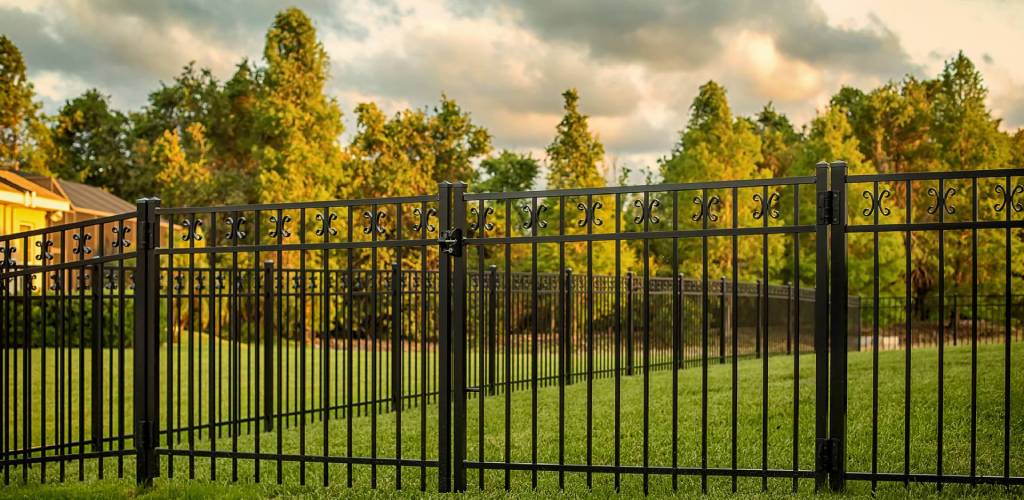All Categories
Featured

Selecting the right secure fencing product for your property is a decision that stabilizes visual appeals, performance, and spending plan. Among the most preferred alternatives, timber, vinyl, and aluminum each deal distinct benefits and drawbacks. Comprehending these can help you make an informed option that aligns with your needs. Here's a failure of the advantages and disadvantages of these 3 common fencing materials.
Wood Secure Fencing. Wood fencing has been a timeless option for home owners due to its natural elegance and versatility.
Pros:. Aesthetic Appeal: Wood provides a traditional and cozy appearance that enhances a variety of building designs. Personalized: It can be repainted, discolored, or cut into distinct designs to suit individual choices. Economical: Originally, timber secure fencing can be an inexpensive alternative contrasted to various other products. Eco-Friendly: Timber is a renewable resource and can be sustainably sourced. Cons:. High Upkeep: Wood needs routine sealing, staining, or painting to avoid rot, insect damage, and weathering. Durability Issues: Without appropriate treatment, wood can warp, split, or decay over time, specifically in areas with high humidity. Much shorter Lifespan: A wood fence normally lasts 10-20 years, depending on the kind of timber and level of maintenance. Wood is ideal for those who value a traditional look and are eager to devote to its maintenance.
Plastic Secure Fencing. Vinyl is a modern, low-maintenance fence option that has grown in popularity recently.

Pros:. Low Maintenance: Vinyl does not need paint, discoloration, or sealing and can be quickly cleaned with soap and water. Climate Resistant: It holds up against severe climate condition without decomposing, rusting, or warping. Long-Lasting: Vinyl fencings can last 20-30 years with minimal maintenance. Variety of Styles: Available in lots of shades, styles, and appearances, some plastic alternatives resemble the appearance of timber. Disadvantages:. Higher Upfront Cost: Vinyl fence can be more pricey originally compared to wood. Brittleness in Cold Weather condition: In extreme chilly, vinyl may crack or come to be fragile. Restricted Services: Private panels can be challenging to replace, requiring cautious matching to the existing fencing. Vinyl is ideal suited for house owners seeking a resilient, low-maintenance option with modern appearances.
Aluminum Fencing. Light weight aluminum secure fencing is a long lasting and lightweight choice, usually chosen for its modern look and versatility.
Pros:. Rust-Resistant: Aluminum doesn't rust, making it a superb selection for humid or wet environments. Low Maintenance: Requires marginal maintenance and is very easy to clean. Sturdy: While light-weight, aluminum is strong enough to hold up against many environmental problems. Lengthy Life expectancy: Can last several decades without significant wear or damage. Range of Styles: Offers a streamlined and sophisticated look, often utilized for ornamental or decorative functions. Cons:. Higher Expense: The initial financial investment for aluminum fence is greater than wood or vinyl. Less Privacy: Aluminum fencings are commonly designed with open pickets, making them less reliable for privacy. Prone to Dents: Although sturdy, aluminum can be dented by strong impacts. Aluminum is suitable for those seeking a trendy, lasting alternative that needs marginal care.
Making the Right Choice. Each secure fencing product-- timber, plastic, and aluminum-- provides distinct benefits and downsides. Your choice must depend upon your specific priorities, such as budget, maintenance preferences, environment, and visual goals:
If you like a standard look and do not mind regular upkeep,Select wood. Select plastic if you want a low-maintenance, weather-resistant fencing with modern-day charm. Select light weight aluminum if you focus on durability, corrosion resistance, and a smooth layout. By weighing these advantages and disadvantages, you can select a fencing product that boosts your residential property while meeting your practical requirements.
Latest Posts
Learn How to Save Big on Car Maintenance with Montclare Auto Repair’s Exclusive Deals
Published May 26, 25
1 min read
Discover Why Chicago Drivers Select Montclare Auto Repair for Trusted Service and Big Savings
Published May 24, 25
1 min read
Unlock WyHy Federal Credit Union – Top Benefits for Your Financial Success
Published May 23, 25
1 min read
More
Latest Posts
Learn How to Save Big on Car Maintenance with Montclare Auto Repair’s Exclusive Deals
Published May 26, 25
1 min read
Discover Why Chicago Drivers Select Montclare Auto Repair for Trusted Service and Big Savings
Published May 24, 25
1 min read
Unlock WyHy Federal Credit Union – Top Benefits for Your Financial Success
Published May 23, 25
1 min read